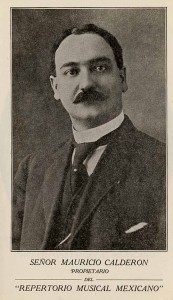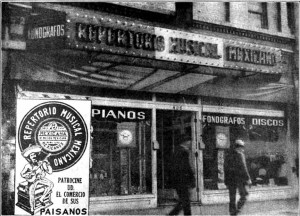Repertorio Musical Mexicano – Mauricio Calderón

Repertorio Musical Mexicano was the first store in Los Angeles to cater directly to the musical needs of the Mexican community. In a 1918 newspaper advertisement, they declared:
“Mexicans: This store was established exclusively for your patronage. No other place could serve you better because we, in a word, treat you like Mexicans and Compatriots.1″

Calderón (8/20/1881 – 6/3/1945) was born in Chihuahua, Mexico and came to Los Angeles in 1913. Through his store Calderón became a major figure in the Spanish language music scene.
According to Pedro J. González, Calderón was in charge of everything in Los Angeles that related to Mexican music. He recruited talented musicians by advertising in the Spanish-language press, and kept an ear out for the latest musical trends among the city’s performers and audiences. Not only did Calderón make money by serving as a go-between between American companies and the Mexican artists, but he also held a monopoly on the area-wide distribution of these recordings through his store. A standard practice of the time for such businesses was to sell phonographs as well as records, and stores such as Calderón’s profited as well from these items. In fact, Calderón’s store, located at 418 (sic) North Main Street near the Plaza, regularly promoted itself by using a loudspeaker mounted in front on the store playing the latest corrido. A small group of men regularly stood in front of the store, listening intently and enjoying the music. (Sanchez 183)2

Calderón was also very involved in radio. He purchased air time from local radio stations and sponsored Spanish language radio programs, re-selling the time to advertisers catering to the Mexican community.
It was at Repertorio Musical Mexicano where the original members of the famed Los Madrugadores first met. The Sanchez Brothers (Jesús and Victor) went to the music store in hopes of getting on the radio. There they met Pedro J. González who was just starting a new radio program. The brothers got the job, were invited to have free room and board at González’s home, and by 1933 Pedro J. González and the Sanchez Brothers were recording for Columbia Records as Los Madrugadores.3
Calderón’s death was front page news in Los Angeles’ Spanish language newspaper La Opinion (see below).
Notes:
Thanks to Philip Sonnichsen who provided his research on Repertorio Musical Mexicano and Mauricio Calderón and sent a translation of Calderón’s obituary from La Opinion, June 4th, 1945
All images, catalogs, and 78 rpm records from the Arhoolie Foundation Frontera Archive.
1. Colin Gunckel, Mexico on Main Street – Transnational Film Culture in Los Angeles before World War II, (New Brunswick: Rutgers Univeristy Press, 2015) 40
2. George J. Sanchez, Becoming Mexican American – Ethnicity, Culture, and Identity in Chicano Los Angeles, 1900-1945, (New York: Oxford University Press, 1993) 182
3. Chris Strachwitz, Zac Salem, based on research by Philip Sonnichsen, Liner Notes, Pedro J. González & Los Madrugadores, Arhoolie Records 7035, 2000, Compact Disc
